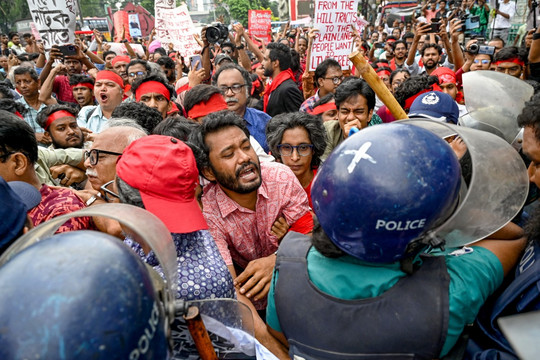Updated 31.07.24
Shakil Hossain, a correspondent for the Daily Bhorer Awaj newspaper, was killed while reporting in Bhorer Awaj, Gazipur City, on July 18, while Abu Taher Md Turab, who worked for the Daily Jalalabad and Daily Naya Diganta newspapers, was killed on July 19 when police began firing into a procession in the northeast city of Sylhet. Turab was wearing a press vest when he was fatally shot.
The killings of Hossain and Turab bring the confirmed media death toll to three, with journalist Mehedi Hassan killed after he was shot in the head while covering a clash between law enforcement and protesting students and activists in Dhaka’s southern Jatra Bari area.
The Bangladesh Federal Union of Journalists (BFUJ) confirmed that at least 160 journalists have also reportedly been injured while covering the widespread protests against the reinstatement of government hiring quotas. According to the BFUJ, the attacks on media came predominately from authorities and individuals attempting to ‘sabotage’ the ongoing student movement.
Tahir Zaman Priyo, a former videographer of online news portal The Report 24 was also shot dead on Friday afternoon, confirmed by the outlet’s human resource manager. Priyo had resigned from the outlet six months prior.
Media rights and press freedom organisations including the BFUJ, Dhaka Reporters Unity (DRU), Law Reporter’s Forum, and the Editor’s Council of Bangladesh, condemned the attacks and the deliberate targeting of journalists during the protests, calling on all parties to ensure the safety of the media.
Journalists have also been subject to verbal abuse, stealing of equipment, and damage to vehicles, with many forced to hide their identities, according to DRU President Syed Shukur Ali Shuvo. “We are concerned by realising how unsafe it is to become a journalist in this country,” said Shuvo.
Bangladesh has been experiencing violent protests since late June when the High Court of Bangladesh reinstated a job quota that reserved close to one-third of civil services posts for the children of those who participated in the Bangladesh Liberation War in 1971.
What began as a protest by university students demanding reforms to the government job quota system in early July soon erupted into a deadly nationwide protest as students and pro-government supporters clashed with armed police. Dozens have been killed and hundreds injured as riot police used tear gas and rubber bullets against protesters armed with sticks.
The office of the state broadcaster Bangladesh Television (BTV) in Dhaka was set alight on July 18 after police took shelter in the premises, with journalists and media workers reportedly still inside.
The BMSF said: “BMSF strongly protests the killing and wounding of journalists and demands that a neutral judicial commission is formed to investigate all incidents of violence against the media. All parties, including police, opposition members, and protesters representing different groups, must ensure the safety of journalists.”
IFJ General Secretary Anthony Bellanger said: “The killings of journalists Shakil Hossain, Abu Taher Md Turab, and Mehedi Hasan, and injuries to hundreds of journalists while covering the protests in Bangladesh are deplorable and must be subject to immediate and thorough investigation. Media coverage of protest movements and events in the public interest is of utmost importance, and authorities must ensure the safety of journalists and media workers through these periods. Reports of widespread communications shutdowns are also of grave concern, and the government must ensure freedom of information by fully restoring internet and phone access.”

